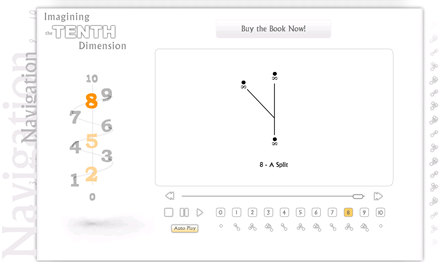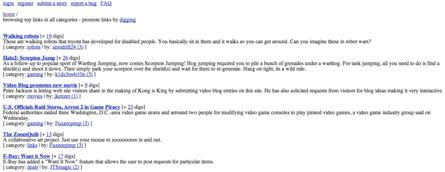We live in a 10-dimensional world
Wednesday, December 27, 2006

The majority of theoretical physicists now a days have come to the conclusion that to understand our universe we need 10 dimensions and not the 3 typical laid out by our Greek ancestors.
It is easy for us to visualize 3 dimension, as this is the way we live: things have a width, length, and height. In fact, the x, y, and z axis of Cartesian coordinates is all we need to visualize stuff.
Even the 4th dimension is somewhat easy to conceptualize, for example, I can tell you "meet me at the 18th floor of 1 Yonge St. at 3:00 PM on December 28, 2006" and you will know exactly what I mean. With this trivial example I have covered 4 dimensions: width, length, height, and time. Visualizing 4 dimension is rather impossible, as we can't really "see" 4 dimension, but we
have found ways to "fake" it.
What do the other 6 dimension do? Or how to even visualize them?
I won't claim to understand string theory, however, I'm very curious about the theory of everything (M) and I find the idea of parallel universes fascinating, which is in fact the predominant theory of how the big bang came to be: two
branes collided against each other and here we are discussing its very consequences. And according to the same theory, there could be an infinite number of other "us" discussing or not discussing the same theme--the possibilities of there being infinite parallels universes is, well, infinite.
There is much to explain, but I won't go into the details as I'm sure I would screw it up at some point so I will leave the research to you. However, I found a flash movie that tries to explain what a 10-dimensional universe may look like.
I thought it was very ingenious, and I immediately tried to find out who came up with the idea. As it happens, there is a book written called "Imagining the Tenth Dimension." I haven't read the book, but did see the flash movie. It feels right, but I'm not an expert and the writer and creator is no physicist. In fact,
Rob Bryanton is a producer of sorts, a sound engineer, and the president of a company called
Talking Dog.
Is he, and in turn his visualization movie, credible? Well, he doesn't have the right credentials, but does it matter if he ends up being correct? Which I am not saying he is, but it is a very clever way to explain a very hard problem and very easy to understand, which is in the end the main flaw of the visualization (in my point of view): it is too easy.
However, other things seem easy once fully explained, for example, calculating areas and volumes for different shapes is second nature now thanks to Calculus (this was a very, very hard problem), and even 20th century concepts such as the photoelectric effect or relativity seem very simple to understand (they are not--there is much math involved), however, anyone can say that when a photon hits a metal plate an electron is let go because of the collision, or that time is actually relative. (In this case this anyone person is me, and any of the statements I made are particularly technical, however, they are not wrong--they have been simplified.)
My point is that just because the visualization of 10 dimensions has been simplified its very core by this gentlemen, it doesn't mean that he is wrong because the majority of us will understand it. However, I would like to see more of the evidence as to why his version is indeed correct. And this is the catch-22 for me: I don't want to buy the book because I know it won't be indepth enough to convince me that it is correct, however, I want to buy it just because it such a simple way to visualize a very hard problem.
For now, I will keep watching the flash movie. If in fact this is the correct way to look at our reality, it is quite an achievement:

I knew it

A few
posts ago I wrote about the fact that blog content will become sponsored. I said:
And for the world of "content" (and this includes blogs), it is all about advertisement dollars, unless the content is sponsored by some major corporation.
Sponsoring will probably become the norm in the future, and this fact will make finding bias-free content almost an impossibility. For example, how do you know that Wired didn't pay me to write about their article? Or that google didn't pay me to advertise their "imagelabeler" game? For the record, no one pays me to write, but will every blog come with a disclaimer that they are totally and completely independent? I surely hope so.
I knew that sponsored blogs existed, I just didn't have any proof. Well, you could call proof a couple of emails sent to me asking to write something about a couple of different products. I never did write anything, I'm not sure how I feel about it--I'm actually debating if I should get rid of the google ads you see on the right side of every blog entry.
But these guys surely do know how they feel "
Microsoft hands out Ferrari's to bloggers." I'm quite sure it feels very good typing sponsored content in their shiny new computer.
I don't know what the rules of the game are in this situations, as the laptops came with a copy of Vista (Microsoft's new OS), but it would be really funny if these guys didn't install Vista and opted to put Linux in them.
FYI, I prefer my laptops to be black and of the ThinkPad type (the smaller the better)...
Google's profile manager...NOT
Tuesday, December 19, 2006
I wish google didn't keep track of me everywhere I go. Though it is hard not to use their applications, as most are free and are actually useful.
This very blog is powered by Blogger (acquired by google some time ago). However, I am reconsidering new options. Why? Because google doesn't provide a profile manager (at least not that I know) that lets me specify to which applications I can apply the same profile.
Some may say that that is the one of the selling points of a multi-service company: one identity and everything under one roof--they should know who I am at all times.
I agree, it should be like that. However, last week I switched to the new Blogger beta and whenever I log in to blogger to do my thang, I'm automatically logged in to everything google. That's right, I go gmail.com and I'm already in my inbox. I search for anything on the search engine, and it keeps track of what I'm looking for--those pesky cookies.
This unification of IDs shouldn't break other applications. Currently, if I'm logged into gmail and blogger, at the same time, and sign-out from either application, I find my self logging into the one I didn't want to stop using in my current session.
The way I would like it to work is that when I click the "Sign Out" button/link in my gmail account, I should be able to continue using blogger. Oh, I almost forgot, if I'm signed into gmail or blogger, I don't want google to track my searches. I know it is supposed to be anonymous and private and that the search cataloging is used to serve me better, but hey, I don't know where that data will REALLY end up. Not that I'm doing any exotic searches, but does anyone care that I have acid reflex? Oh yeah, acid reflex drug vendors...
Google dudes and dudetes, can you fix this? Or add a profile management tool? If you want me to, I can work on it.
Digg's UI redesign is a bit user-unfriendly
Monday, December 18, 2006
Digg is cool, and sometimes unbearable.
The idea of news filtering is not actually new. Slashdot made its money this way: users submitted stories together with links, moderators approved them to let people make comments on them.
This formula generated a large number of hits and along came someone with bags of money knocking at ComdrTaco's doorstep to buy the business. The guy who started it,
Rob Malda, made a pretty penny and the owners let him keep doing whatever he was doing with the site. The rest, as they say, is history: slashdot is still kicking around, sometimes with old news, but it is still around. At one point I thought they should change their catchy phrase to "old news for nerds, stuff that mattered yesterday."
Digg is slightly different than slashdot, however, it is the same concept. The main difference is that anyone registered to digg can submit stories to get dugg by other registered users. There are no moderators, as there are in slashdot. If a story is good enough to make its way into the home page, it will do so by sheer number of votes.
It is as democratic as it gets. This is good and bad, as the common denominator predominates and it has been argued that the voting system is broken. Some users abuse the voting privilege by "digging" some friendly diggers' stories more than others. So, in the end the stories that make it to the main page are few and selected, and probably not the best stories.
The web site keeps evolving, some things change and others do not. The owners, for example, refuse to fix one of the main items people complain about (including me): the lack of threaded comments (use the
site, and you will see what I mean. I am sure there is a good reason for having this, but I am too lazy to look it up).
Changes to the interface are common, but I think the usability of the site has degraded a bit: going from minimalist to quite a lot of choices. For example, this is what the original application looked like (click the image to see a readable version):

Aside from adding a search box, I would not have changed anything.
For the latest iteration, look below. When I stripped the site's content (the actual stories), I was left with 34% worth of stories, and the 66% left is composed of navigational links, advertisement, and informational links--and I almost forgot, they have space to sell digg T-shirts, too.
I personally think the original version is better, however, we cannot stop change. Moreover, priorities change and some money has to be generated at some point. This is after all another of those 3 facet business models:
1. Create a news filtering service.
2. ???
3. Profit.
This is what the page looks like now (click on the image to see a larger version):

If it were up to me, I would start all over again and go back to a "less is more" design. The new page has 35 options of things to do before I can start clicking on the actual stories. I made this comment on the site, but I will probably get dugg down, which is part of the whole democratic experience: if you know a lot of users and are friendly with them, you will be dugg up, else suffer the consequences of negative diggs. (I am in the latter category of users, which is probably an indication of the quality of my comments.)
BTW, I do know that it is much easier to critique something than come up with something original and that it is really hard to design to please everyone under the sun, so note that I am just expressing an opinion. The site is still cool, regardless of cluttered new UI.
Notes:
1. I got the first version of digg's image from this
post (without permission).
2. I believe less is more. Google also thinks so (and they are worth billions, so they probably know what they are doing). Do you recall google's first web page? If you don't, this is what it looked like:
November 1998.
This is what it looks like now:
Current.
Remarkable, is it not? And google not only does search. They do a
lot more.
For the hard core developer in you
Thursday, December 14, 2006
There is always something interesting happening in the software development world. However, this week has been quite exiting, I think. There have been 3 new toys unleashed into the wild:
- GWT - Google Web Toolkit went open sourced. That's right, you can actually download ALL the source code that goes into the API--everything is there, including the Java to JavaScript compiler. (GWT example application.)
- Microsoft released (for free) XNA Game Studio Express .This is actually Microsoft's framework to develop games for Windows and, get this, Xbox 360. If you want to actually load the games to the Xbox, you need to subscribe for the XNA Creators Club ($99 USD for a year subscription).
How cool is that? Don't buy those overpriced video games for the Xbox. Code them yourself :) Realistically speaking, I doubt you will be able to compete with large game publishing companies, but who knows, games are not just bells and whistles or the most realistic blood dripping rendering.
- Microsoft released (for free) Microsoft Robotic Studio. This is software development platform used to create robotic software. I'm thinking you can write a controller for a robot with moving arms that screams: "danger, danger."
Coolness aside, these are very well planned marketing strategies: cater to developers, who will use your development tools to create applications that will be used in your platforms, and by doing nothing more than "giving away" tools expand your market share and brand.
So which one do I like most?
I downloaded the GWT code and started playing around with it--very nice.
I surfed around the Robotic Studio site and checked out a couple of the robotic sample apps and I'm not quite sure I like the "visual" programming paradigm (note that I didn't download the SDK).
As per the XNA Studio, I think this one is a must have (I haven't installed it yet, as I don't think my laptop can handle the graphics requirements).
Now, if I could only convince my body that I don't need sleep, I could try them all. ALL, I tell you. However, I have reasoned that if evolution hasn't gotten rid off for the need to sleep, maybe I should voluntarily succumb to the gateway to dreamland.
XBox 360 better than the Wii and PS3, at least in availability
Sunday, December 10, 2006
I've been looking for a Nintendo Wii for Gabriel. I haven't really looked too hard, but if I find one, I'll buy it.
Today I realized Microsoft beat Sony's PS3 and Nintendo's Wii to the punch line. Comparing these three systems, some would say that the 360 system is better in most respects, including the number of games available. And if you look at the supply of hardware, the XBox 360 is everywhere. Microsoft has saturated the market in a world where the PS3 and the Wii are nowhere to be found. It's almost painful to call this "market competition."
I understand the need to limit the supply in this case, as to increase marketing hype of the machines, however, when you have a strong competitor with deep pockets and countless systems that have been available for almost a year in every electronic store ever opened in North America, what's really the point of launching?
Perhaps, this is the point: limit the supply, and get a foot in the "next generation" console market share by claiming to be "better" than the next guy. I think the timing may be off and the quantity to really compete may be to small, so it will be an uphill battle to catch up with the main alpha dog in town. (I should clarify that the problems to bring new products to the market are many and there are operation limitations that have led to Sony and Nintendo delaying and limiting the number of consoles. In other words, it is not just about timing, it's about the realities of new product development.)
I can attest to not being loyal to any technology, really. If it works for me, I'll buy it even for a premium. But the point is that it should be available.
This afternoon, I needed paper for my printer and visited the local Best Buy big-box store by my house. I like going to these type of stores (electronic stores) and I think my 6 year old son is getting a taste for them as well (he makes me proud). We check out the video games that he may like and, as I said, I was looking for a Wii, but I almost bought a 360, just for the fact that they were available--literally, a wall built with hundreds (OK, maybe not that many) brand new shining XBox 360 consoles.
Was I looking for a 360? No, not really. I wanted a Wii, but I think Microsoft understands the technology market, and knows that by putting a product substitute in the hand of the consumer they will be able to out-sell non existing PS3s or Wiis regardless of the technological differences.
So, for this round, Microsoft 1; and PS3 and Wii
i, where
i is the representation of the square root of negative 1 (imaginary numbers), for being as elusive as pink unicorns or a wet
phoenix.
Make your own google search engine
Thursday, December 07, 2006
This is just
plain cool (some math involved, but worth the read).
Wikipedia's auto-blocking is wrongly implemented
Friday, December 01, 2006
Wikipedia's editing process is not perfect. After all, letting anyone and everyone update "facts" on the internet is prone to vandalism and inaccuracy. However, Wikipedia's method to police the site is actually ISPism. I mean that Wikipedia's site autoblocks a whole set of IP addresses, and for errors of one, everyone pays.
I update Wiki pages from time to time, as an unregister user. Tonight I tried to do so again, and I found myself autoblocked. I then tried to create an account and, as it happens, I can't do that either because, you guessed it, my IP is blocked.
What is the reason? I'm guessing someone using the same ISP I use messed around with some Wiki pages and
Luna Santin decided to block everyone in shooting distance. This is the reason:
06:38, 1 December 2006 Luna Santin (Talk | contribs) blocked "70.55.0.0/16 (contribs)" with an expiry time of 3 days (Continued disruption including trolling and physical threats from this ISP. Please register an account from a different web connection, such as your local library, and log in at home to edit. Sorry.)
Again, I understand that the integrity of the entries has to be maintained, but block everyone because the IP address stars with 70.55.0.0 doesn't make too much sense to me. It's illogical I think, as the ISP company I use is one of the largest in the country and has thousands of users. It would be like arresting everyone in LA because there was a bank robbery in downtown--this example is a bit of an exaggeration, but you get my point. Imagine having all that power in this type of environment. Who knows, maybe someone wrote that Luna smells and he took it out on everyone. "Absolute power corrupts absolutely," some British dude said once (brownie points if you know who).
Aside from creating accounts, I think this would be a worth while endevour to figure out what to do about policing Wikis. And not just anything, but something that actually prevents web-vandalism from the actual perpetrator and not everyone that may "look" similar to the guy or gal that did it.
As far as my contribution goes, I may have something very important to add, but I won't anymore. The world will just never know how to...